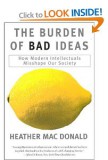The Burden of Bad Ideas: How Modern Intellectuals Misshape our Society

|
Title | The Burden of Bad Ideas: How Modern Intellectuals Misshape our Society |
| Author | Heather Mac Donald | |
| Reviewer | Heather Wood Ion | |
| Review Date | August 30, 2010 | |
| Publisher | Ivan R. Dee | |
| Year | 2001 | |
| Rate this Book |
This book is a polemic. It is witty, provocative, and brave enough to address some of the fundamental problems we face. No thoughtful person would argue with the author that there are major problems in our criminal justice system, our social services, public education, and public health and in the ways we address these issues.
With great clarity Heather Mac Donald cries foul over the implementation of bad ideas which she blames repeatedly on “institutions that have been perverted by today’s elite intellectual orthodoxy.” Her first chapter takes issue with scientific philanthropy and its agenda of social change and urges a return to the moral judgments of Carnegie. She is deeply passionate about the cant around racism, feminism and identity politics. Her examples are both funny and deeply disturbing: is there in fact a course in biology that considers feminine ways of analyzing cellular metabolism? She labels as “coercive philanthropy” a climate which she says forces arts institutions to conform to an ideology of multicultural self-esteem. She also criticizes the idea of collaboration in grant-making, and attacks the imposition of partnerships on efforts and services that not only are ignorant of each other, but share few if any methods of communication. However, as she urges us “to praise virtue and blame vice” in our philanthropic lives, she does not address the fundamental question as to who decides who is deserving and who is undeserving? Having condemned the teaching profession, the social service sector workers, and their professional training, Mac Donald does not say what’s next: what happens in her own ideal world.
She does repeatedly, in most essays, call for greater personal responsibility and rational choice. This is admirable except when absurd, such as her condemnation of the pregnant thirteen-year old that did not, in Mac Donald’s view, make a rational moral choice or seek self-reliance. Where is the comparable group of thirteen-year olds? The extremes of contrast between the worlds of homelessness, illiteracy and drug addiction with the world of moral judgments, self-reliance and conscious choice Mac Donald advocates are commanding of our attention. The balance between advocacy and social service is difficult at best. If Mac Donald’s illustrations are even in part accurate, each of us must rethink our efforts to contribute to bettering our society.
However, polemic is aggressive, hostile opinion. This is not scholarship, and it is not objective reporting. Mac Donald’s extremes often cause the reader to question the legitimacy of her views. For instance in her discussion of homelessness she says “no one is going hungry on the streets” and suggests that the “homeless may prefer the streets.” The latest USDA report1, however, shows that at least 14.6% of Americans live with food insecurity. In her discussion of public health Mac Donald equates teenage pregnancy and the rise in illegitimacy to the availability of social services. The assumption of such simple correlations that Mac Donald makes in this as in other areas are simply not verifiable, and are sometimes refutable, by deeper examination. Reliable analysis by The Guttmacher Institute, for example, questions why the teen birthrate in the U.S. is the highest in the industrialized world even though our medical and social services provide the least amount of care and safety.
When she takes on teacher training, Mac Donald is particularly witty and particularly incensed. She opposes student-centered learning, progressive theories of education, diversity training toward "social and economic justice” and the cult of "relevance.” She is scornful of journaling, the use of videos in the classroom and ”facilitation” instead of teaching. She advocates content expertise, discipline, structure, coherent curricula, and an educational system which uses grades and competition. Most of the failures of public education she blames upon teacher training to an ideology she labels liberal. She does not examine teacher burnout, recruitment or incentives. We are left with a deeply hopeless picture which ignores the administrative and financial burdens of our public schools even though we may agree with some of what Mac Donald sees as necessary.
The focus of many of these essays is New York City, and at times that makes Mac Donald’s views insular, as well as dated. Often in the book the real enemy perceived by Mac Donald is not the specific subject but the political correctness surrounding the subject. Nevertheless, she is eager to condemn with labels of her own: social change is bad, all academics are liberal, disadvantaged people lack character, women blame others for their behavior, etc. (In defense of her view, we do live in a society in which domestic violence is defined in some states as a pre-existing condition disqualifying the woman from health insurance.) As with most polemic, the argument may be exciting, but the truth may be distorted to serve the ends of the particular opinion.
The book is disturbing, challenging and in the end, sad. It is sad to see an advocate of morality, self-reliance and knowledge reject the Enlightenment values of exploration, experimentation and verification. Concluding one chapter is this paragraph:
The city ought to restore the distinction between the deserving and undeserving poor. For the poor who do deserve and can benefit from help, especially children, the state and city should consider the use of boarding school-like institutions outside the city. But those who behave the most irresponsibly should no longer have the greatest claim on city revenues. And for the most part, the city should get out of the business of social uplift, which three decades’ experience has proved is beyond the capacity of municipal government to accomplish (172).
This advocates totalitarian interventions and at the same time abandons civility. Mac Donald views the age of the great industrialists Carnegie and Ford as a golden one because the values promoted were those that brought about success—self-discipline, education and a powerful work ethic. Mac Donald’s aggressive scorn for attempts to encourage human flourishing or achieve social justice convey a cynicism not, thankfully, shared by Carnegie and Ford.
Heather Wood Ion is a cultural anthropologist, currently with Athena Charitable Trust, and a contributing editor to Conversations on Philanthropy.
1USDA Economic Research Service "Food Security in the U.S.", November 16, 2000.http://www.ers.usda.gov/Briefing/FoodSecurity/.



